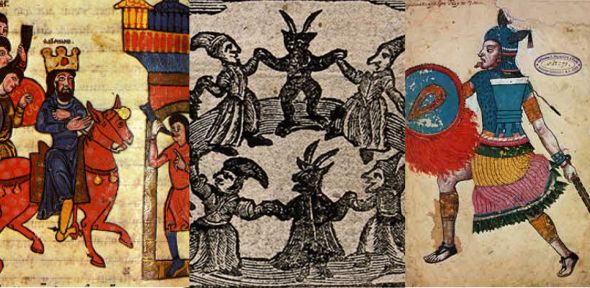This paper is available for the academic year 2023-24.
The study of the Iberian Middle Ages and Spanish early modern period is fundamental to the understanding of modern Spain and its culture. These eras were times of intense political and religious upheaval, yet they fostered a rich, vibrant literary and artistic culture unique in Europe. Historically the peninsula was a site of successive waves of invasion and colonization so that its cultural substrata encompass pagan, Christian, Judaic, and Islamic influences. As a result medieval Hispanic culture is diverse and distinctive in its mixture of Islamic, Hebraic and Christian elements.
After the fall of the Islamic state of Granada to the Catholic Monarchs in 1492, the Castilian language became dominant, the Spanish state had cemented its power, and the themes and ideals that were to shape later Spanish literature and thought had taken root. At this point, Spain developed the largest and most important Empire in the Early Modern period, and was poised at a dynamic moment when it was simultaneously at the height of its power and already on the brink of decline. Across the Atlantic, the conquest of Mexico brought the cultural and political complexity of the Iberian world into contact and conflict with diverse indigenous societies.
Students will acquire a sound knowledge of the literature, art, social and political history of the Middle Ages and Early Modern period in the Spanish peninsula, enabling them to understand key concerns of this era within the unique context of the multicultural society of medieval Spain. One topic focuses on medieval culture (War and the Hero), two topics address central early modern preoccupations with love and the demonic (The Great Romance & Playing the Devil), and introduce students to the richness and variety of expression of those themes through important literary and dramatic texts. The fourth topic will introduce students to the representation of members of the three faiths (Christianity, Islam and Judaism) in the medieval and early Modern periods and give a historical overview of their relationships through an exploration of convivencia (lit.
living-togetherness).
Finally, in the transatlantic component of this paper, students will develop a nuanced understanding of the construction of colonial Latin American narratives by analyzing indigenous and European perspectives on a single historical event (Writing the Conquest of Mexico).
Students should note that SP3 also provides excellent preparation for the Part II Medieval (SP14) and Early Modern (SP7) papers.
War and the Hero
Set texts
Gonzalo de Berceo, Vida de Santo Domingo de Silos
Libro de Alexandre
Poema de Fernán González
The Great Romance
Set texts
Ana Caro, Valor, agravio y mujer
Miguel de Cervantes, Los trabajos de Persiles y Sigismunda
Garcilaso de la Vega, Obra poética
Agustín Moreto, El lindo don Diego
Lope de Vega, Rimas humanas y divinas del licenciado Tomé de Burguillos
Playing the Devil
Set texts
Pedro Calderón de la Barca, El mágico prodigioso
Miguel de Cervantes, El licenciado Vidriera and El casamiento engañoso y Coloquio de los perros in Novelas ejemplares
Tirso de Molina, El condenado por desconfiado
Francisco de Quevedo, Sueño del infierno and Alguacil endemoniado, in Los Sueños
Luis Vélez de Guevara, El Diablo Cojuelo
María de Zayas, El jardín engañoso, in Novelas amorosas y ejemplares; La perseguida triunfante in Desengaños amorosos
Writing the Conquest of Mexico
Set texts
- Hernán Cortés, Segunda carta-relación
- Bernardino de Sahagún, Historia general de las cosas de Nueva España (Florentine Codex), Book XII + Paintings from the manuscript
- Manuscrito del aperreamiento
- Bartolomé de las Casas, Brevísima relación de la destruición de las Indias
- Bernal Díaz del Castillo, Historia verdadera de la conquista de la Nueva España
Race, Place & Society
Set texts
al-Hassan, Ahmad Y., & Donald R. Hill, Islamic Technology: An Illustrated History (Cambridge: UP, 1986).Christians and Moors in Spain: i, 711-1150, and ii, 1195-1614, ed., Colin Smith (Warminster: Aris & Phillips, 1989); iii, Arabic Sources, 711-1501, ed. Charles Melville & Ahmed Ubaydli (Warminster: Aris & Phillips, 1992).
Cummins, John G., ed., The Spanish Traditional Lyric (Oxford: Pergamon, 1977): kharjas.
Domínguez Ortiz, Antonio, La clase social de los conversos en Castilla en la Edad Moderna, Archivum, 23 (Granada: Univ., 1991).
Frenk, Margit, ed., Lírica española de tipo tradicional, Letras Hispánicas, 60 (Madrid: Cátedra, 1990): kharjas, nos see 2-21.
Glick, T. F., From Muslim Fortress to Christian Castle: Social and Cultural Change in Medieval Spain (Manchester: UP, 1995).
Kamen, H., The Spanish Inquisition: An Historical Revision (London: Weidenfeld & Nicholson, 1997).
Menocal, María Rosa, Raymond P. Scheindlin & Michael Sells, The Literature of Al-Andalus (Cambridge: UP, 2000).
- Catherine Davies, ed., The Companion to Hispanic Studies (London: Arnold, 2002); chapters 2 and 3.
- Alan Deyermond, A Literary History of Spain: The Middle Ages (London: Benn, 1971).
- J.H. Elliott, Imperial Spain, 1469-1716 (Harmondsworth: Penguin, 1963; reprints).
- Matthew Restall and Felipe Fernández Armesto, The Conquistadors: A Very Short Introduction (Oxford: OUP, 2012).
- Henry Kamen, Spain, 1469-1714, 2nd edn (London: Longman, 1991).
- Angus MacKay, Spain in the Middle Ages (London: Macmillan, 1977).
Full reading list
Please see the full reading list here.
The teaching for this paper will consist of lectures, seminars and supervisions focused upon each of the five topics. Students will normally study three out of the five topics, with four or five lectures devoted to each.
Please see SP3's Moodle page.
Assessment will be by end-of-year examination. This paper is also available for examination by Long Essay.
Please see the specimen paper for the revised SP3.
Prof. Rodrigo Cacho |




